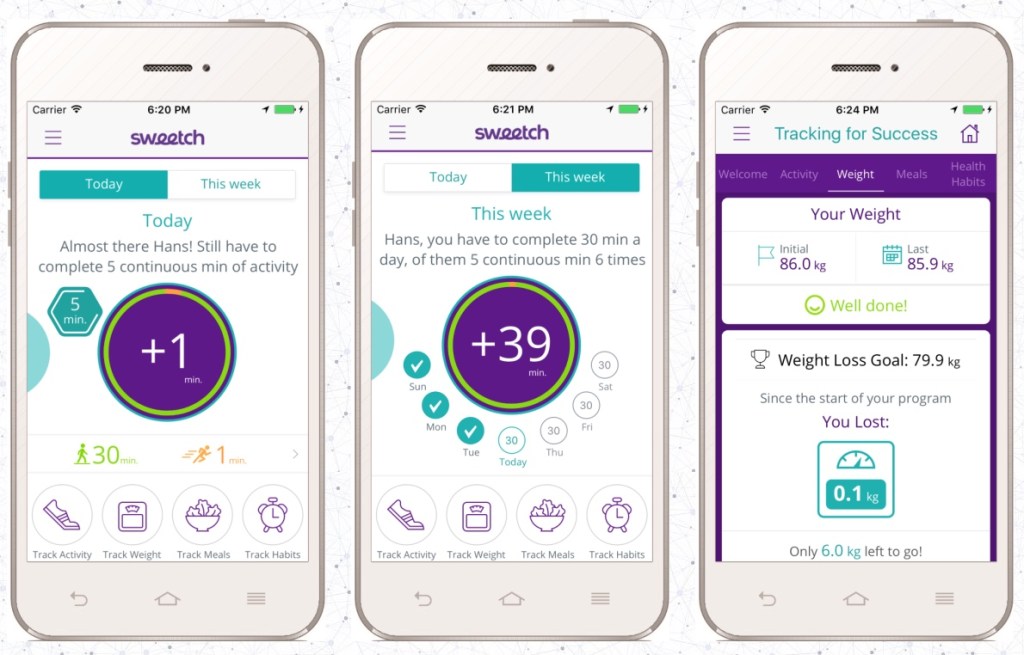You’ve just sat down to dinner and your wearable device reminds you to get up and get in your steps for the day. Maybe the app has a point, but odds are you’ll push the notification to the side. The founders of Sweetch, an Israeli company creating its own AI-driven behavior change app, are betting that if you got that notification in a different way, you’ll be more likely to take its advice.
Yossi Bahagon, the founder of Sweetch, describes the company’s approach to digital reminders as a mixture of artificial intelligence and emotional intelligence. The app will use AI to analyse “lifeprint” data picked up through a smartphone. Then it delivers messages to when you might be more likely to respond to them and in a “tone of voice” that encourages compliance.
For instance if you have meetings on Mondays between 12 and 3, but still want to get in some exercise, Sweetch won’t suggest getting a workout in during those times, or shame you for sitting through a meeting rather than getting a run in.
“It’s about ongoing hyperpersonalized engagement that increases the likelihood of the patient doing what [they need] to do,” says Bahagon.
On Monday, Sweetch announced a $20 million Series A round led by Entreé Capital. Other investors include Tal Capital, Noaber, Kortex Ventures, Insurtech VC, Fin TLV Ventures and existing investors Philips, OurCrowd and Qure Ventures.
Bahagon is a family physician by training, but he’s spent the majority of his career in the digital health arena. In 2008 Bagahon founded the digital health division of Clalit Health Services, a nonprofit insurance and medical services provider that currently insures 60% of the Israeli population. His previous company, Luminox Health, was acquired by Israeli investor platform OurCrowd in 2016, and Bahagon stayed on to manage the fund’s digital health arm.
Sweetch, which was founded in 2013, is yet another digital health venture for Bahagon — this time aimed at increased patient compliance. The app has already generated some interest and was one of five apps selected from over 400 to participate in the Bayer G4A program, something like an accelerator developed by the pharmaceutical giant.
So far, Sweetch CEO Yoni Nevo says the app has “tens of thousands of users,” (the company would not provide a specific number).
It’s currently being used in patients with cardiovascular diseases, diabetes, obesity, hypertension, rheumatoid arthritis, inflammatory bowel disease, and, in a bit of a departure from the rest: breast cancer treatment.
Sweetch isn’t designed for users to download at will on the app store (you can download it, but won’t get far without an access code); their go-to-market strategy is instead to partner with healthcare organizations, pharma companies, payers or providers. Then providers might prescribe Sweetch alongside the actual treatment to encourage them to stick with it.
There is evidence that people don’t always follow doctors’ orders — particularly when it comes to chronic conditions. One 2017 report from the CDC notes that one in five prescriptions written in the United States are never filled, and up to 50% of medicines were taken incorrectly (at the wrong time, wrong dose, etc.).
Improving patient compliance, though, is a more complicated problem. The CDC report outlined a few solutions — some of which have more to do with the healthcare system than they do with health tech. Those include lowering economic barriers to medication, increasing team-based healthcare (your pharmacist and doctor coordinating prescription refills, for instance), and increasing access to healthcare in the first place.
The report does highlight an avenue for health information technology to help address the noncompliance problem (it specifically mentions e-prescribing software).
Tech, like Sweetch, can only address the noncompliance problem in medicine if it doesn’t have a noncompliance problem of its own. To that end, Bahagon says the app has a record of user retention. “Even after 24 months, we still see around 45% of the patients that started using the system continue to use it,” he says.
User retention is a good sign for any app developer. But in the health space, it’s more complicated. Some studies suggest that consumer ratings are poor markers of how well these apps work to improve outcomes (you might like an app and use it, but it doesn’t make you any healthier).
In that regard, Sweetch does have a trial under its belt, conducted at two sites in the Johns Hopkins Clinical Research Network.
The app was tested on 55 adults with prediabetes over the course of three months. Forty-seven of the participants finished the trial, and on average, they increased their physical activity by an average of 2.8 MET-hours (they may have actually exercised for shorter periods, but their intensity was the equivalent of 2.8 hours of work), and lost about 1.6 kilograms.
The users also lowered their A1c levels, a key measure of average blood sugar. Prediabetic adults usually have an A1c between 5.7 and 6.5 percent, and those in this trial reduced their A1c levels by about .1% (the study refers to that reduction as “clinically meaningful.”)
This study didn’t specifically compare Sweetch to any other prediabetes interventions. However, a study on that is upcoming. In a December 2020 interview, Bahagon noted that Sweetch had received a grant from the National Institutes of Health to continue testing Sweetch against other “gold standard” interventions for diabetes.
Nevo and Bahagon didn’t provide concrete updates on the project, but noted that “in a month or so” the company may announce updates on the NIH funding and upcoming randomized controlled trials.
In the meantime, the company plans to use the Series A funding to expand into markets in the U.S. and Brazil, grow the user base and enhance the platform to provide specific and tailored recommendations for even more conditions.
Health clouds are set to play a key role in healthcare innovation































Comment